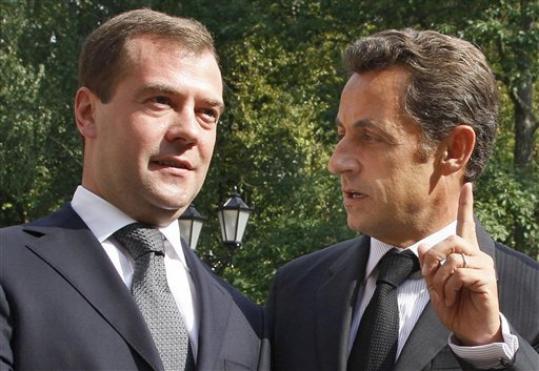
SARKOZY-MEDVEDEV PLAN FLAWED IN SUBSTANCE AND PROCESS
Publication: Eurasia Daily Monitor Volume: 5 Issue: 155
By:

French President Nicolas Sarkozy’s initiative for a Russian cease-fire in Georgia (see accompanying article) is undoubtedly a helpful short-term measure, dictated by military necessity. It is also a welcome sign of more active European involvement in the South Caucasus after a long period of neglect. The French president and his Minister of Foreign Affairs Bernard Kouchner may even have developed the ambition to match, in the South Ossetia conflict, the role that Germany is attempting to play as honest broker in the Abkhazia conflict.
Sarkozy’s six-point plan is, however, a Sarkozy-Medvedev plan, fully approved by Russian President Dmitry Medvedev. It would require Georgia to pay a heavy political price, now and in the future, for the cessation of Russian military hostilities on August 13 (if the cessation holds). Unless significantly amended, the August 12-13 text of the plan would unwittingly strengthen Russia’s hand in annexing South Ossetia and blackmailing the Georgian government. The plan’s not-so-hidden traps need to be removed in order for the document to become a basis for further negotiations.
Cessation of hostilities is a far broader concept than a cease-fire. If Russian forces continue rampaging and looting in Georgian towns and villages, blockading Georgian airspace and ports, and moving troops in a threatening manner in Georgian territory–all of which continues to happen–it means that Russia has not ceased hostilities, even if it does not resort to artillery cannonades or air bombings as it did until August 12.
The plan necessitates the following basic specifications and clarifications:
–Specify a deadline for an international peacekeeping operation, including a Russian element, to replace Russia’s monopolistic “peacekeeping,” which is now even more deeply discredited than before;
–Place the international operation under bona fide international auspices, with the EU as the optimal choice. Sarkozy blundered when declaring on August in Moscow that EU involvement in peacekeeping would depend on “consent by both sides,” i.e., subject to Russia’s veto. This emboldened Medvedev to reply during the joint press conference that Russia would not budge on this issue (www.kremlin.ru, August 12);
–Include a reference to Georgia’s territorial integrity and the inviolability of its borders as the basis for any political settlement. The document in its present form merely contains a vague allusion to UN and OSCE decisions, without even citing any of these. Georgia would be mistaken to be content with vague references of this sort, in lieu of wording that clearly upholds integrity and inviolability. The German plan on Abkhazia also fails to mention Georgia’s territorial integrity and sovereignty. In that case, Georgia demands that this formula be included. Tbilisi can do no less with regard to South Ossetia and the Sarkozy plan, even if–and particularly because–this is essentially a Franco-Russian plan;
–Add a commitment to the refugees’ right of return to South Ossetia and Abkhazia, in line with Sarkozy’s acknowledgment in Tbilisi that this omission needs to be corrected; and
–Provide for the return of Georgian administrations in those parts of South Ossetia and Upper Abkhazia from which Russian forces evicted the legitimate administrations.
Sarkozy agreed on the plan with Medvedev first, and revealed the document to the Georgian leaders only afterward, when he landed in Tbilisi and asked for acceptance at first sight. Georgian leaders had only seen a leaked outline of the plan online in a Paris daily newspaper (Liberation, August 12) while Sarkozy was already airborne from Moscow to Tbilisi.
The plan’s flaws reflect quick improvisation by French drafters under time pressure, most likely by a short-handed staff at the peak of the vacation season (a circumstance that must have entered into Moscow’s calculations). In fairness to Sarkozy, he clearly admitted in Tbilisi that the plan was subject to reworking (Georgian Public Broadcaster, August 13).
The plan does not bear any French, Russian or Georgian signature. Thus, neither French prestige nor Georgian credibility is on the line. As Sarkozy clearly implied in his Tbilisi press conference, this document is simply a sketch, to be amended and, perhaps, developed further. Even if railroaded through the European Union’s ministerial meeting without detailed examination and with some help from Russia-Firsters there, this document in its present form does not involve any obligations for the EU, its individual member countries or Georgia to make the concessions to Russia that this document envisages.
Sarkozy defines his role as that of a mediator, acting both in a French national capacity and as current holder of the European Union’s presidency. Paris seeks to line up EU support as quickly as possible behind Sarkozy’s initiative.
The six-point document sets the conditions for a Russian cessation of hostilities at the cost of concessions deeply damaging to Georgia (see accompanying article). The presumed bargain seems, however, to be collapsing only hours after the public announcement. In a demonstration of disrespect to the French president, Russian forces on August 13 seized the city of Gori, moved tanks in the direction of Tbilisi and engaged in looting rampages in various localities inside the country, beyond the South Ossetian and Abkhaz “conflict zones.”
The French president had ventured to Moscow without being properly briefed about Russia’s agenda of re-expansion. In the joint news conference with his Russian counterpart, Sarkozy endorsed a major Russian doctrine: “It is absolutely understandable [perfectly normal] that Russia wants to defend [uphold the interests of] its own citizens [compatriots] and Russian-speaking people beyond the borders of [outside] Russia” (www.kremlin.ru in English and Russian, August 12). While editorial columns across Europe compare this doctrine with that of Nazi Germany in the 1930s–and while Baltic and Central-Eastern European countries express deep concern about this Russian doctrine–Sarkozy lightheartedly endorsed it in Moscow. On this as on other major issues, the French presidential staff and Quai d’Orsay seem to have ill-served their president.




